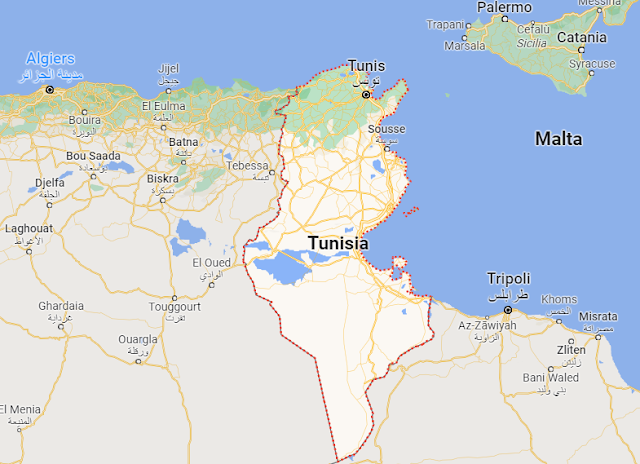Iraq court jails 18 cops for failing to halt torching of Swedish embassy
over Qur’an burning
Iraq jails police for failing to halt torching of Swedish embassy after Quran burning
Saudis co-hosting UN event aimed at revamping Israeli-Palestinian
peace process, without Israel or Palestinians
Terror thwarted: Explosion in Tel Aviv park, terror suspects caught
Gholamreza Qasemian, Director Of The Iranian Majles’s Library, Museum, And Archives: Israel Will Self-Destruct Within Three Years; After That, We Will Fight Saudi Arabia And Conquer Mecca
Saudi authorities set dress code for women making Umrah pilgrimage
The attire must be loose fitting, free of ornaments and cover the body
In other words, "We don't care what you wear as long as you are invisible."
Tunisia expels hundreds of sub-Saharan African migrants amid crackdown
Tunisian authorities expelled hundreds of sub-Saharan African migrants from the port of Sfax Sunday after they were thrown out of their homes during unrest in July, a rights group said.
"The security forces on Sunday evacuated a square where some 500 migrants were assembled in the centre of Sfax," Romdane Ben Amor, spokesman for the FTDES non-government organisation, told AFP.
He said the migrants were "dispersed in small groups towards rural areas and other towns".
Since Saturday, authorities in Tunisia have been cracking down on illegal migrants, most of whom are from sub-Saharan African countries.
According to authorities, around 200 migrants "who were preparing to make the clandestine boat trip" towards Europe were arrested.
Tunisia is a major gateway for migrants and asylum-seekers attempting perilous sea voyages in hopes of a better life in the European Union.
Racial tensions flared in Tunisia's second city of Sfax after the July 3 killing of a Tunisian man following an altercation with migrants.
Humanitarian sources say that at least 2,000 sub-Saharan Africans were expelled or forcibly transferred by Tunisian security forces to desert regions bordering Libya and Algeria.
(AFP)
UNESCO lists ancient ruins near West Bank city of Jericho
as World Heritage Site
A U.N. conference voted Sunday to list prehistoric ruins near the ancient West Bank city of Jericho as a World Heritage Site in Palestine, a decision likely to anger Israel, which controls the territory and does not recognize a Palestinian state.
Jericho is one of the oldest continually inhabited cities on earth, and is in a part of the Israeli-occupied West Bank that is administered by the internationally recognized Palestinian Authority. The listing refers to the Tell es-Sultan archaeological site nearby, which contains prehistoric ruins dating back to the ninth millennium B.C. and is outside the ancient city itself.
The decision was taken at a meeting of the U.N. World Heritage Committee in Riyadh, Saudi Arabia, under the auspices of the U.N. Educational, Scientific and Cultural Organization, UNESCO.
Israel quit UNESCO in 2019, accusing it of being biased against it and of diminishing its connection to the Holy Land. Israel also objected to UNESCO's acceptance of Palestine as a member state in 2011. But Israel remains a party to the World Heritage Convention, and it sent a delegation to the meeting in Riyadh.
Israel captured the West Bank, along with Gaza and east Jerusalem, in the 1967 Mideast war. The Palestinians want all three territories for their future state. Israel views the West Bank as the biblical and cultural heartland of the Jewish people.
There have been no serious or substantive peace negotiations in over a decade, and Israel is currently led by the most nationalist and religious government in its history, making any move toward Palestinian statehood nearly unimaginable.
The modern city of Jericho is a major draw for tourism to the Palestinian territories, both because of its historical sites and proximity to the Dead Sea. In 2021, the Palestinian Authority unveiled major renovations to one of the largest mosaics in the Middle East, in a Jericho palace dating back to the 8th century.
Tell es-Sultan, an oval-shaped mound, contains evidence of one of humanity's first-known villages and an important Bronze-Age town dating back to 2600 B.C. It is around 2 kilometers (1.2 miles) from the remains of the first city of Jericho, which contains ruins of importance to Jewish history, including a synagogue dating back to the first century B.C.
UNESCO, which refers to the site as Ancient Jericho/Tell es-Sultan, took pains to clarify that the two are distinct.
“The property proposed for nomination is the prehistoric archaeological site of Tell es-Sultan located outside the antique site of Jericho,” Ernesto Ottone, UNESCO's assistant director general, said during the meeting to discuss the site.
“Later historical developments, which span over millennia and are demonstrated by material remains beyond the boundaries of Tell as-Sultan, constitute a rich cultural context, worth of historical interest and preservation, covering among others, Jewish and Christian heritage. However, this is not the focus of the proposed nomination.”
Historical heritage has long been among the many flashpoints in the Israeli-Palestinian conflict, with both sides using archaeology and conservation to demonstrate what they say is their own unique connection to the Holy Land.
The Palestinian Authority, recognized a decade ago by the United Nations as a nonmember observer state, welcomed the designation of Tell es-Sultan.
President Mahmoud Abbas said in a statement that it “testifies to the authenticity and history of the Palestinian people," adding that “the state of Palestine is committed to preserving this unique site for the benefit of mankind.”
There was no immediate comment from Israel.
Paris-based UNESCO began the World Heritage List in 1978. It includes a broad array of over 1,000 sites — from the Acropolis in Athens to the Great Wall of China — nominated by their respective nations.
(AP)













No comments:
Post a Comment